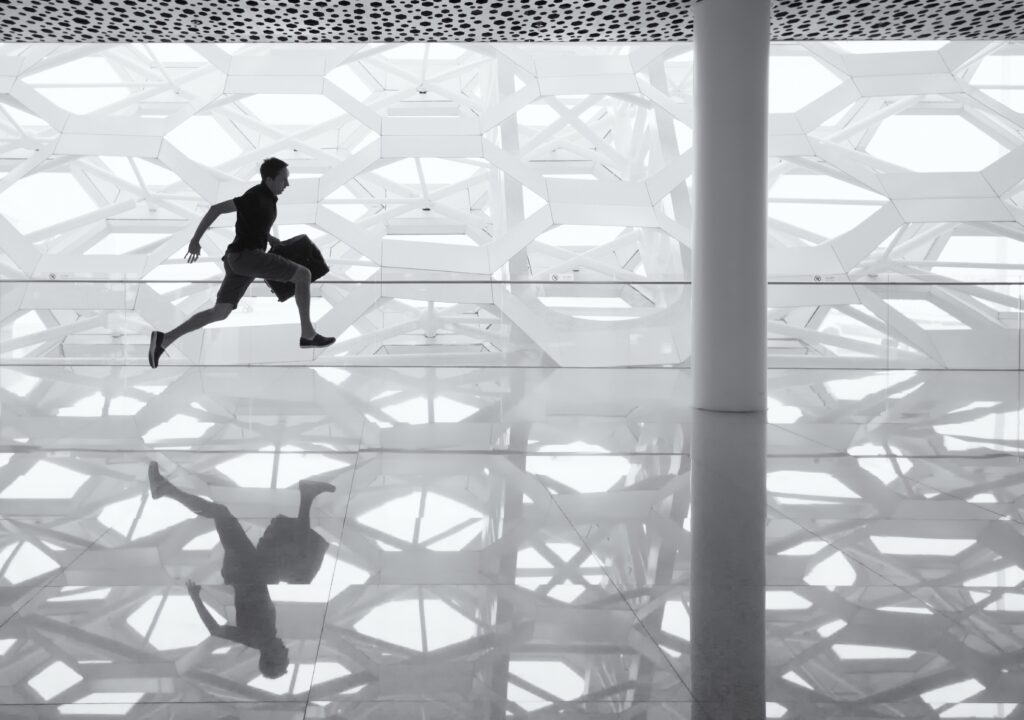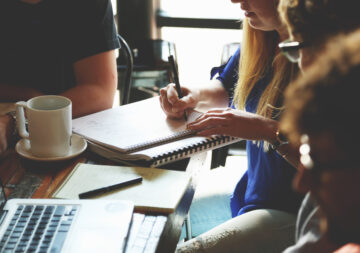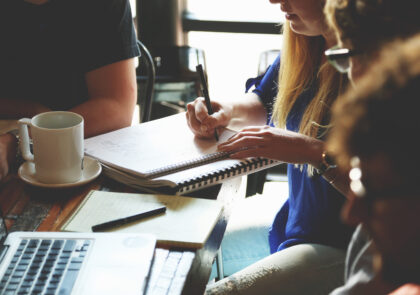
The last few years have demonstrated that profound change is not only possible but can occur with little warning and far-reaching consequences. How well companies and entrepreneurs adapt to these changes, and take actions to shape desired futures, has a direct impact on workplace wellbeing. The Bounce Forward project consortium cultivates the skillsets that allow for flourishing amidst the new normal of working life. What vision should my company aspire to? What surprises could be around the corner? What skillsets do I need to develop to answer these questions?
Authors: Martyn Richards, Annukka Heinonen & Kaisu Isomäki
Keys to a successful post-pandemic work life
Working practices in Finland were changing long before the global pandemic, but incremental trends became radical shifts for knowledge economy workers (Sostero et. al. 2020, 12-13). SMEs and entrepreneurs experienced rapid changes with far reaching impacts on workplace wellbeing. The shift to remote and hybrid working had both positive and negative knock-on effects that affected individuals in disproportionate ways. Feelings of isolation and uncertainty, as well as high employee turnover (Eurofound 2021, 1-4) have degraded organisations’ cultures of innovation and community learning. Yet the post-pandemic recovery period is seen as an opportunity to make a departure from outdated practices, to implement new ideas that are a better fit to the new conditions, and to learn to better cope with future crises. Capabilities that support wellbeing through innovation and resilience are thus the keys to a prosperous future.
The Bounce Forward project (resilienssiatyoelamaan.fi) fosters clusters of capabilities through a dual-track programme offering; Resilience Workshops for SMEs, and Futures Agent trainings for knowledge economy professionals (Bounce Forward 2022).
Capabilities for surviving and thriving
Resilience is a widely used term for the ability of an organization or individual to withstand or recover from sudden negative changes, but it also has a broader meaning. It can also refer to change and innovation – learning and adapting, to not only recover, but to thrive. Features of a resilient organization include, continuous community learning and innovation, anticipation and preparedness, awareness of goals and common direction, and doing things together, experimenting and making mistakes. (Janhonen & Malinen 2022; TTL 2022.) Researchers highlight people centricity, networks, learning and leadership in strengthening resilience for both individuals and organizations. The wellbeing of individuals at all levels of organizations plays a role in strengthening overall performance. The Covid-19 situation has highlighted the individual aspects of resilience. (Janhonen & Malinen 2022.)
The capabilities approach takes the position that “Capabilities are […], an ensemble of opportunities for choosing and acting. They are the answer to the question: “what is this person able to do and be?”” (Poli 2015, 106). Thought about in this way, the future plays a critical role in what we believe we can do now in the present, both implicitly and explicitly defining freedom through the range of alternatives that we are able to perceive. Hence, developing individual and organisational resilience requires a holistic approach that acts on motivational, as well as cognitive and active dimensions. The role of learning theory and futures thinking will be discussed further in a later article in this series, for the present it is enough to note that using futures in the present calls on a wide range of skillsets including systems thinking, creativity and imagination, and critical self-awareness of our assumptions and values (Pouru-Mikkola & Wilenius 2021, 8).
Knowledge comes to life through collaboration
Transformations occurring within the workplace require specialists to develop not only their individual skills, but also to implement and integrate those skills at an organisational level through collaborative and experimental methods. In Bounce Forward, the competencies of the consortium are offered to participants as a toolbox of thinking and acting tools that produce value through collaborative trainings, and practice-oriented experiments.
LAB University of Applied Sciences brings simulation learning methods to the table, alongside a wealth of experience with developing resilience and sustainable thinking. The simulation method illuminates complex issues such as sustainability and resilience thinking, making it easier to plan the ideal actions at the practical level (LAB).
The Finland Futures Research Centre offers competencies in foresight tools for analysing the relevance of the long-term perspective to decision making in the present, as well as complementary expertise in futures literacy, which can be used to diversify how and why we make use of anticipated futures (Balcom Raleigh 2020).
Centria University of Applied Sciences uses service design to support resilience through process co-design. Collective learning processes are fostered to improve how knowledge is put into practice.
Pajulahti Olympic and Paralympic Training Center contributes wellbeing support to Bounce Forward programme participants. Their solution-oriented coaching supports self-management and the ability to address disruptive changes.
Resilience building toolboxes for individuals and organisations
Resilience Workshops for SMEs develop organisational capabilities to anticipate and act in the context of changing environmental conditions. In a participatory setting, organisations address the manifestations of complexity behind the everyday situations of their organization, explore possible and desired futures, and enter a dialogue with alternative pathways that may express a more sustainable fit to the post-pandemic environment. The goal of the workshops is to develop internal sources of competency that strengthen the ability to change and create new opportunities for change. Each organisation selects a topic to develop according to their own needs. Expert-intensive SMEs from Uusimaa, Päijät-Häme and Central Ostrobothnia participate in this programme.
Futures Agent trainings aim to strengthening individuals’ capacity to enact change through leadership by developing their understanding of complexity and futures thinking. The training is designed to increase the internal capacity for creative collaborations, to enhance opportunities for the co-development of organizations, and to support the development of skills that help individuals to navigate uncertain and emergent futures. Training, including webinars and small group work, progresses from identifying problems and opportunities to attain broader insights, solutions, and tools. Futures Agents go on to champion experimental innovations in their own organisations.
Bounce Forward is well positioned to respond to the challenge of develop the skillsets of a broad range of stakeholders, each of whom operates in a specific and unique context while linking enhanced futures thinking to the specific challenges that organisations face in day to day working life.
References
Balcom Raleigh, N.A. 2021. Demystifying futures literacy, a key skill for climate innovation. Cited 2 June 2022. Available at https://medium.com/flxdeep/demystifying-futures-literacy-a-key-skill-for-climate-innovation-4cf868a63e93
Bounce Forward. 2022. Cited 25 May 2022. Available at https://resilienssiatyoelamaan.fi/
Eurofound. 2021. Living, working and COVID-19 (Update April 2021): Mental health and trust decline across EU as pandemic enters another year. Luxembourg, Publications Office of the European Union. 1-4. Cited 25 May 2022. 4. Available at https://www.eurofound.europa.eu/publications/report/2021/living-working-and-covid-19-update-april-2021-mental-health-and-trust-decline-across-eu-as-pandemic
Janhonen, M. (ed.) & Malinen, S. 2022. By using their resilience, organizations can survive even from severe crisis. Podcast. Cited 1 Jun 2022. Available at https://filosofianakatemia.fi/podcast/jakso-23/
LAB. Simulaatiopalvelut. Cited 2 Jun 2022. Available at https://www.lab.fi/fi/palvelu/simulaatiopalvelut
Poli, R. 2015. The implicit future orientation of the capability approach. Futures. Vol. 71. 106. Cited 1 Jun 2022. Available at https://doi.org/10.1016/j.futures.2015.03.002
Pouru-Mikkola, L. & Wilenius, M. 2021. Building individual futures capacity through transformative futures learning. Futures. Vol. 132. 8. Available at https://doi.org/10.1016/j.futures.2021.102804
Sostero, M., Milasi, S., Hurley, J., Fernández-Macías, E. & Bisello, M. 2020. Labour market change Teleworkability and the COVID-19 crisis: a new digital divide? Working paper, COVID-19 series. Luxembourg, Publications Office of the European Union. 12-13. Cited 25 May 2022. Available at https://www.eurofound.europa.eu/publications/report/2020/living-working-and-covid-19
TTL. 2022. Resilienssi organisaatio. Cited 31 May 2022. Available at https://www.ttl.fi/tyoyhteiso/tyon-kehittaminen/mita-on-resilienssi/
Authors
Martyn Richards has an MSSc in Futures Studies. He works as a project specialist and educator at the Finland Futures Research Centre for the Bounce Forward project. He has specialised in futures literacy and transformative learning approaches.
Annukka Heinonen (MBA, UAS), is an RDI specialist at LAB University of Applied Sciences and works
as a specialist in the Bounce Forward project.
Kaisu Isomäki (BBA, ICT-engineer (UAS)) works as a project planner in the project Bounce Forward at LAB University of Applied Sciences.
Illustration: https://pxhere.com/fi/photo/502868 (CC0)
Published 10.6.2022
Reference to this article
Richards, M., Heinonen, A. & Isomäki, K. 2022. How to Bounce Forward: Capabilities for surviving and thriving in the new normal. LAB Pro. Cited and date of citation. Available at https://www.labopen.fi/lab-pro/how-to-bounce-forward-capabilities-for-surviving-and-thriving-in-the-new-normal/






